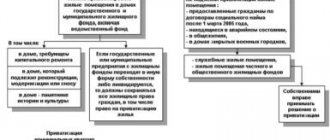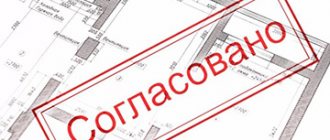People planning to become the full owner of the property in which they live take advantage of the opportunity to privatize their living space free of charge. However, such plans are often hindered by the accumulation of arrears in payments to the housing company.
Representatives of the HOA refuse to issue the necessary certificates to such residents, justifying their actions by the accumulated late payments for housing and communal services. Let us clarify whether it is possible to privatize an apartment with debts on utility bills and how to correctly perform these steps.
From a legal point of view
First of all, we propose to determine the content of the privatization process. Privatization is the only available method of converting public housing (municipal) into private ownership (property).
The law allows literally every citizen who has a residence permit to use their privatization right in an apartment that is rented on the basis of a social tenancy agreement. The legislation allows privatization to be carried out free of charge no more than once. Upon completion of this process, a person becomes a private owner of property in the form of an apartment. But what to do if the privatized housing has utility debts?
In answering this question, let’s turn to the law and find out its “point of view.” In Russia there is a separate law regulating the privatization process and it is appropriately called . ” This law is not supplemented by any regulations regarding utility debts.
Important! Accordingly, we can safely say that at the legislative level, there are no prohibitions for the implementation of the privatization process.
The only thing you need to know is that every resident of Russia has the right to free privatization of housing only once in their life. Further, this procedure will cost money. An exception is the situation in which a citizen took part in privatization before he came of age. Then, having matured, a person has the right to another free privatization.
What to do if you are rejected because of debts?
Unfortunately, in practice, obstacles arise constantly. During the privatization event, a citizen may be faced with the fact that he is not given a certificate of registered residents or the local administration refuses to accept documents. It is possible to cope with such circumstances, since they are unlawful, but this will require time and knowledge of the peculiarities of the process.
To privatize housing with or without debts, you will definitely need to obtain two documents from the management company - a certificate of family composition and an extract from your personal account.
To obtain such forms, you must contact the office of the Criminal Code. When an employee issuing certificates refers to a gross violation, you need to remind him of legal liability for committing a gross violation of:
- Art. 8 Federal Law-149 dated July 27, 2006;
- Art. 14 and Art. 20 Federal Law-152 dated April 20, 2006.
We invite you to familiarize yourself with: Power of attorney to represent the interests of a legal entity: sample
If this does not help, then you need to contact the head of the Criminal Code, who will probably issue a certificate in order to exclude subsequent communication with the prosecutor’s office and possible punishment under Art. 19.1 Code of Administrative Offenses of the Russian Federation (arbitrariness). Today, citizens can submit an application to this structure online, which significantly reduces the processing time and allows them to quickly achieve the desired result.
This also happens everywhere, so to appeal decisions made, a citizen can go to court. The application must be submitted no later than three months from the date of receipt of the refusal decision.
In this regard, it is important to obtain a document where officials indicate in writing the reasons why privatization was refused. If utility debts were indicated as the basis for a negative decision, then the plaintiff can expect to receive a decision in his favor within 1-2 months.
In the future, it is enough to submit this document to Rosreestr in order to re-register the apartment as personal property. Sometimes the consideration of a case can drag on for 5-6 months, but it is worth trying, since the likelihood of winning the case is very high. However, even if the court decides in favor of the plaintiff, the debts are still subject to repayment within the established time frame.
The privatization of the housing stock in Russia has been going on for many years, but citizens continue to face unlawful actions by passport officers and housing office workers. Of course, if the rent arrears are not very large, you can try to pay off the debts and continue the privatization procedure.
Well, if the debt is huge, and you can pay it off only by selling your own home, and for this you need to privatize it, then you get a vicious circle of insoluble problems. Keep in mind that the requirement to provide a certificate of absence of utility debts in this case has no legal basis, so feel free to go to court.
Appeal in court
To submit an application to the court, request a written refusal from the passport office to receive documents for privatization by writing an application addressed to the head of the department. Acting on the basis of the law and protecting the interests of citizens, the court will invalidate the refusal, and you will be able to continue privatization.
Such issues are within the competence of the Justices of the Peace and are resolved within 2 weeks. However, remember that if you decide to sell your privatized housing, you will still have to pay off the debt, otherwise the utility company may go to court to collect the debts from you.
Duty and opportunity under the law
To the question of whether it is possible to privatize housing with housing and communal services debts, the law answers in the affirmative.
This means that municipal authorities have no right to refuse a citizen privatization.
Note! At absolutely any time, the person registered in the apartment has the right to begin processing papers for privatization. At the same time, utility debts cannot serve as at least some obstacle to the privatization of an apartment.
Alternative options
Privatization of housing with rent arrears is a complex process, accompanied by nuances in the procedure. If you do not go to court, there is an alternative method of resolving the conflict.
Debt recalculation
If debt obligations have accumulated over 3 years, then payment from the applicant is not required. It is worth referring to the statute of limitations.
In this case, it is worth asking to recalculate the debt, excluding the statute of limitations.
Installment payment
There is also the possibility of payment by installments. You can agree with the management company to pay the debt later.
For this purpose, an installment agreement on debt obligations is drawn up. After this, the necessary documentation is issued.
Find out who has the right to privatize an apartment. How is the privatization of a private house and the land plot underneath it carried out? Information here.
What are the terms for free privatization of an apartment? Details in this article.
Housing exchange
In this case, it is possible to exchange a large apartment for a small one. And instead of the difference in square meters, pay off debt obligations.
These schemes are becoming more common. And realtors are more often involved in this process.
When reality and law do not intersect
It should be recognized that in reality everything happens exactly the opposite: the law says one thing, but local officials say something completely different. Unfortunately, such an “author’s” reading of the federal law is no exception for Russia, especially when it comes to municipalities and small towns. Many laws are openly ignored by local officials, turning the lives of ordinary people into a “struggle for survival.”
According to current practice, the presence of debt for utility services is a serious problem for the ability to privatize housing.
Keep in mind! The problem is that the list of documents required for privatization includes certificates of forms 7 and 9 . These certificates are issued only by management companies, housing offices and passport offices. Therefore, if there is a fact of debt for housing and communal services, a person simply will not be able to obtain the necessary certificate: he will be refused to issue it, up to the full payment of the debt.
According to the current legislation, which we discussed above, such actions are illegal and unacceptable. Therefore, the current situation is ambiguous and problematic, and every person, taking this into account, should know how he can exercise his rights if he has a rent debt.
What should the debtor do?
Representatives of the HOA will refuse to provide the debtor with the documents required for privatization of the apartment
Let’s look at the nuances of collecting documents for the procedure, since difficulties arise precisely at this stage. To start the process, you will have to start by collecting the necessary papers. Here you will need the following list of documentation:
- papers from the BTI: plan and technical passport of the apartment;
- social rental agreement;
- an extract with the housing cadastral number;
- ID cards of registered residents;
- certificate of non-use of privatization rights;
- receipt of payment of state duty;
- Form 7 certificate on the technical characteristics of housing;
- 2 certificates of form 9 about the number of persons registered in the apartment.
Let us note that the last two papers become a stumbling block for consumers who are in debt to the HOA. Let's consider popular ways to solve the problem of how to privatize an apartment with debts on utility bills.
If you follow the letter of the law, such a decision by the employees of the management company can be considered arbitrariness and a violation of the Code of Administrative Offenses of the Russian Federation
Let's start with legal regulations. The refusal of a housing office employee to provide the necessary papers is considered arbitrariness and abuse of official authority . Responsibility for such actions is provided for in Article 19.1 of the Code of Administrative Offenses of the Russian Federation. Accordingly, the subscriber will need to correctly record this refusal in order to obtain evidence for judicial consideration of the issue.
Remember, only a court order issued in favor of the consumer can induce utility companies to perform certain actions.
However, it is appropriate to take into account that legal costs in this situation are borne by the losing party. That is, the court’s refusal to satisfy the plaintiff’s demands will also result in additional costs. Accordingly, competent preparation for the process in such situations becomes the key to success.
Algorithm of actions for a tenant
Now let’s look at the procedure step by step on how to privatize an apartment with rent arrears. The first stage for the resident here is to submit a request to the housing company to issue the necessary certificates. Please note that an oral refusal is difficult to prove in court, so insist on a written response from the housing office . In such cases, the request is submitted by registered mail in two copies indicating the specific date of this application.
To obtain evidence for a likely lawsuit, it is appropriate for the tenant to record each step in writing, communicating with authorities through certified letters with notification
Lack of response from utility companies or refusal to issue certificates is a reason for a complaint to the prosecutor's office . This article will help readers determine the correct procedure for writing a statement to law enforcement officers. Let us note that in such situations it is also appropriate to record each step in writing and send a request to review the legality of the management company’s actions by registered mail.
The processing time for such complaints varies from 14 to 30 days. During the specified period, the applicant will receive an answer to the question asked. Moreover, it will not be possible to submit such an application again.
The inaction of this structure does not leave the consumer a choice - the only alternative here is the court . It is important to draw up a statement of claim correctly so that the case can move forward. The claim notes the details of the applicant and the court to which the petition was sent, briefly outlines the situation, referring to the provisions of the current legislation, and attaches to the paper the existing correspondence, which serves as evidence of the plaintiff’s words.
Nuances
Let us note that the trial in such situations becomes a kind of lottery. After all, the judge has the right to refuse the plaintiff or force this person to pay off the accumulated debt if the management company makes a counterclaim.
Although judicial practice is such that the main requirement for issuing certificates for privatization is resolved positively for the defaulter , especially when the citizen competently argues his own position.
The court becomes the final authority in resolving such issues
Keep in mind that at hearings regarding debt collection, utility companies will need to prove the provision of services in the amount specified in the agreement with the tenant and provide evidence of the tenant’s evasion of financial obligations . The apartment owner, in turn, has the right to challenge the arguments of the HOA representatives and provide the court with counter-evidence of his own innocence.
Alternative to litigation
Now we will discuss a way to obtain the necessary certificates peacefully. Keep in mind that this option is the optimal solution for people who need privatization of social housing.
Here, the tenant only needs to come to an agreement with the utility companies . Moreover, defaulters will be offered two options: restructuring of payments or a grace period, which gives the tenant a kind of “breathing space.”
A mutual agreement with utility companies on installment payments or a grace period is the optimal solution in such situations
In addition, another option here is to conclude an agreement on debt recalculation. However, in this case, the consumer will need to prove the illegality of charging for previously provided services. Let us note that HOAs readily accept citizens’ decisions to pay the accumulated amount in installments, and in such situations make concessions to debtors.
A mutual compromise saves the debtor’s time - after all, drawing up an agreement on installment payments will take no more than an hour.
In addition, a peace agreement with public utilities also saves the nerves of the person who allowed the debt to accumulate. Such solutions are also preferable in situations where the tenant intends to privatize the apartment for sale.
Indeed, in such cases, the tenant finds himself in a vicious circle, and the categorical refusal of officials to comply with legal requirements is resolved only in court. And the video below will tell you about the utility workers’ vision of the situation.
Privatization in step-by-step execution
In fact, there is nothing complicated or impossible in implementing the privatization process. For clarity and speed of the process, it is necessary to understand the “step-by-step route” and confidently follow it.
As we have already found out, having rent debt can make this process very difficult, but generally speaking, the algorithm for turning municipal housing into your own housing is as follows:
- Make a decision about who will privatize the apartment. The fact is that not all residents want this. Such objectors must write their refusal of privatization in writing.
- Contact the BTI to obtain the necessary certificates.
- Contact the body that owns the housing (the municipality) and get the missing papers.
- Having collected the entire documentary package, contact the chosen authority to carry out privatization. As a rule, this is the city administration.
- Pay the state fee for privatization.
- After waiting for a positive response from the city administration, you need to contact Rosreestr and issue a certificate of ownership there.
Privatization procedure
As a rule, the city administration deals with housing privatization issues. When contacting this authority, it is important to pay a small fee and wait for the appropriate decision. Next, use the registry to obtain a certificate of ownership.
If the property has many co-owners, but all of them cannot handle the paperwork, you need to delegate this responsibility to one person using a power of attorney, which allows you to represent the interests of the others. Another option is agencies specially created to help citizens prepare various documents.
Privatization of an apartment with a rent debt is carried out on the basis of citizens' documents - their passports, refusals and consents of residents (if any), a power of attorney (if it was issued), a technical passport and an extract from the BTI, a cadastral file, a certificate indicating that these citizens have not yet exercised the right to receive square meters in ownership, a housing order, a social tenancy agreement, a certificate of personal account of the home, a birth (marriage) certificate, a court decision on divorce and extracts from the house register. Depending on the type of property, the list may be shortened.
We invite you to familiarize yourself with: Complaint about the inaction of the bailiff on alimony: sample
Privatization with debts is not prohibited in the Russian Federation, and if it is refused, the decision can be appealed legally. These issues are within the competence of the Magistrates' Courts, and the process itself takes about 2 weeks. The basis for going to court is a refusal to privatize, issued by the relevant authority.
But if a person, in turn, does not repay the debt for heating and other housing and communal services, the city administration has the right to file a counterclaim and oblige him to pay all debts in full.
For privatization you must submit a pack of required documents
However, it may not be possible to privatize the apartment. According to Article 90 of the Housing Code of the Russian Federation, if residents do not pay utility bills and there is no good reason for this, the owner of the premises has the right to initiate legal proceedings. As a result, the entire family will be forced to leave their occupied housing. She may be provided with another, more modest place to live - a room in a dormitory, on the basis of a social tenancy agreement.
Documentary package under detailed consideration
As practice shows, privatizing an apartment with utility debts is extremely problematic. But, according to the law, the fact of having a debt does not at all deprive a person of the right to transfer housing from public to private status.
Problems will most likely arise in the process of collecting and preparing the necessary papers. We invite you to familiarize yourself with this important documentary list:
- identity cards of all those registered in the housing;
- refusal or consent of other apartment residents to the privatization process;
- notarized power of attorney (if needed);
- technical passport for the apartment;
- cadastral passport for the apartment;
- background information regarding the fact that these citizens have not participated in privatization ever before;
- social rental agreement;
- apartment order;
- certificate (extract) from the BTI;
- reference information about the status of the personal housing account;
- all possible evidence: marriage/divorce/birth certificate of minor children (if available);
- informative certificate from the house register.
Objectively speaking, the list is not that huge. Many papers for it will need to be obtained either from the BTI, or by contacting the passport office, or from Rosreestr. It is necessary to provide both originals and copies of these papers.
We remind you that even if you thoroughly study all the data that is in the public domain, this will not replace the experience of professional lawyers! To get a detailed free consultation and resolve your issue as reliably as possible, you can contact specialists through the online form .
Is it possible to privatize?
Step by step guide:
- Decide who will privatize the apartment and, accordingly, go through all the authorities to obtain the necessary documents.
- Contact the BTI to receive an explication of your apartment.
- Find out which body your home belongs to and contact them to find out what documents you are missing.
- Pay the state fee for the privatization of housing.
- Submit the entire package of documents and the receipt for payment of the state duty to Rosreestr.
You can deal with the complex procedure of collecting documents and going through the authorities yourself, but many people prefer to delegate this paperwork to specialists from real estate agencies.
In this case, you will need to issue a power of attorney from a notary. As a rule, for a certain amount of money, specialists quickly and professionally collect all the certificates and give you a ready-made package of documents.
Required documents:
- Warrant for an apartment.
- Social rental agreement.
- Cadastral passport of the premises.
- A certificate stating that you have not been a participant in privatization before.
- Passports of everyone registered in the apartment.
- Birth certificates of all minor residents registered in the apartment.
- Technical certificate.
- Certificate of absence of debts on personal accounts.
This is a list of initial documents that will be needed to begin privatization.
During the process, you may need some other documents and certificates, for example:
- An extract from the house register, which will indicate all the places of your residence up to the present moment.
- Certificates that will indicate all minor residents who are currently absent.
More information about what other documents may be needed in your specific case will be explained in the district Department of Housing Policy or in the housing privatization department.
The law “On Privatization...” clearly defines the regulations for the procedure.
We invite you to read: Instructions: how to accept an apartment in a new building
The right to acquire ownership of municipal housing free of charge is granted once to each citizen of the Russian Federation.
However, there are no reservations about impossibility in this document.
To carry out the procedure, documents are submitted, the list of which includes certificates in form 7 and 9. It is this document that officials refuse to issue to those citizens who have debts for an apartment. But without these certificates it is impossible to transfer real estate into private ownership.
Refusal of employees to issue certificates is considered an administrative offense, qualified as “Arbitrariness” and, in accordance with Article 19.1, is punishable by a fine.
You can stop the actions of employees of relevant organizations by filing a complaint with higher authorities.
Code of the Russian Federation on Administrative Offenses Article 19.1. Arbitrariness
Arbitrariness, that is, the unauthorized exercise of one’s actual or alleged right, contrary to the procedure established by federal law or other regulatory legal act, without causing significant harm to citizens or legal entities, except for the cases provided for in Article 14.9.1 of this Code, entails a warning or the imposition of an administrative fine. for citizens in the amount of one hundred to three hundred rubles; for officials - from three hundred to five hundred rubles.
Read about the statute of limitations for invalidating the privatization of real estate, as well as about the deprivatization procedure in our articles. Also find out whether it is possible to privatize a cooperative, service apartment or military housing.
Refusal to privatize: why?
As noted above, people are often faced with the fact that the fact of having a municipal debt leads to a guaranteed refusal in the privatization process. What should you do when this happens? This is the question that interests most people.
Due to the absence of a legislative ban on “debt” privatization, many problems constantly arise. Since the law does not prohibit the privatization of housing with debts for housing and communal services, in the event of an unlawful refusal on the part of officials, it is necessary to act in the following several “scenarios”, namely:
- Situation No. 1 – when there is only a small debt for utility bills.
If you have a small debt, the easiest way is to pay it off. After successful repayment of the debt, privatization will continue.
- Situation No. 2 – when there is a large debt on utility bills.
The debt may be so large that it can only be repaid by selling the home. And in order to sell it, it must first be privatized. In this situation, absolutely no one has the right to demand from a person a certificate of absence of debt for housing and communal services. At the same time, no one has the right to deprive a person of his right to carry out privatization.
Due to this, citizens receive an absolutely vicious circle of problems, which can only be resolved through the courts.
Keep in mind! Denying a person the right to privatization due to utility debts is a judicial matter. Therefore, every person who is faced with this has the right to file a claim in court and appeal against such an unlawful decision.
Legislative side of the issue
To give a clear and unambiguous answer to whether it is possible to privatize an apartment with debts on utility bills, you should first of all familiarize yourself with the provisions of the law.
The basic rules governing this issue are presented in Federal Law-1510 dated July 4, 1991. There are other restrictions that do not allow the privatization of an apartment, but all of them do not apply to rent arrears. For example, only an adult citizen who has a permanent residence permit at the residential address has the right to submit an application for privatization. The only circumstance that can really interfere with such a procedure is that the municipality (the owner of the home, transferring it for the use of a citizen under a social tenancy agreement) has the right to apply to the court for termination of the municipal agreement due to non-payment.
It is worth noting that in this case, it is not the total amount of debt that is taken into account, but the fact that there have been no payments for the last six months. In simple words, the law does not prohibit privatizing an apartment with debts for utilities, but there is a high probability of administrative refusal.
The law gives the right to register ownership of real estate, to freely own and use the resulting housing.
Privatization refers to the provision of square meters to tenants, which they have reserved and voluntarily occupy.
Many people in our country rent and use housing that is municipal or state property. This legal act makes it possible for such people to obtain an apartment or house in personal ownership, which will significantly expand their rights, because housing can be freely disposed of - sold, inherited. For some citizens, privatization would make it easier to resolve certain issues, such as lending.
One person can register ownership of housing if there is consent to this from members of his family registered here and who have the right to receive their share in the form of personal real estate. It is possible to register joint ownership of housing for all persons living in a given apartment. Children from 14 to 18 years old also have the right to privatization. Until the age of 14, they can be the sole owner of the home, but to do this they will need parental permission or a guardian agreement.
When the court is like a “life preserver”
Now you know whether it is possible to privatize housing with utility debts. The law gives its citizens this right. And, if a person has received an unlawful refusal, he should immediately go to court for justice.
At the same time, many people wonder: which court should they go to?
It is the magistrate’s court that deals with issues related to privatization difficulties and problems. Consideration of such a case takes up to two weeks inclusive.
You should know! To go to court, you must have in your hands a refusal to privatize, drawn up in writing.
Despite the positive court decision, the utility debt will have to be repaid in any case. The fact is that if there is a large debt, the city administration will be able to file a counterclaim in court, demanding to collect the full amount of the debt from the debtor citizen.
Legislative side of the issue
In our country, property relations regarding housing are regulated by the Federal Law “On the Privatization of Housing Stock in the Russian Federation.” Following this document, every citizen has the right to become the owner of an apartment. True, he can only do this once.
As for the issue of privatization of housing with debts on utility bills, this is not discussed in any way in the privatization law.
If you are required to pay off a debt before you can begin the process of taking ownership, you can safely challenge these unlawful demands in court.
Is it possible to sell an apartment with a debt?
The question of the possibility of selling housing with the presence of utility debts interests many people.
Following the letter of the law, this right exists, and the answer to this question is affirmative.
Important! All transactions with municipal housing are prohibited, and a person has the right to do whatever he pleases with his own housing. Therefore, the presence of a utility debt cannot be a limitation for the commercial sale of an apartment.
Although, to be fair, it should be recognized that home buyers always want any debt to be paid off before concluding a sale transaction. Of course, it is possible to agree on the issue of repaying the debt after signing the contract for the sale of housing: but everything will depend on the will of the buyer. Otherwise, the burden of repaying debts will fall on the shoulders of the new owner and he will obviously not like this.
Selling an apartment
Let's assume that we have dealt with privatization. The procedure was completed successfully. And now the owners decide to sell it.
Is it possible to sell a privatized apartment with a debt? In this case, there are no prohibitions on the operation. The owner can not only sell, but also donate his property. The main thing is not to have tax debts.
Accordingly, the presence of utility debts is not a prohibition on selling an apartment. But not all buyers are ready to take such a step. Selling an apartment with debts in real life is problematic due to the fact that citizens do not take on such responsibility, worrying about the encumbrance.
There's really nothing to be afraid of. You can privatize an apartment with housing and communal services debt and even sell it after that. Non-payment by the previous owners of the property will remain with them until the very end. This means that new owners do not have to pay off the accumulated debts for “utilities” from the previous residents.
Summary
We found out that the law of the Russian Federation allows its citizens to privatize municipal housing if they have debts for utility services. But, unfortunately, the law and reality run parallel to each other, practically without intersecting.
If difficulties arise in privatization, you should turn to the letter of the law and write a statement of claim to the court. The Federal Law “On Privatization” regulates the privatization process . It does not contain any acts indicating that the presence of debt for housing and communal services may be grounds for canceling privatization.
And as you know, everything that is not prohibited is permissible.
What to do if they refuse to issue certificates in form 7, 9?
- Demand a written refusal to provide a certificate, arguing that the employees’ actions were unlawful by the fact that nothing is written in the privatization law about debt repayment.
- Warn employees that they should immediately contact the prosecutor's office to hold them accountable for obstruction of lawful actions and arbitrariness.
In some cases, you can obtain certificates in form 7 or 9 if you agree with the Management Company that services your house that you will definitely pay off the debt for utility bills after privatization of the apartment.
If this option is acceptable, write a statement asking for a certificate to guarantee payment of the debt.
In practice, this is what happens in most cases. The certificate issued by the Management Company allows you to easily obtain documents at the passport office. But you should not expect that privatization will be extended this time either; it is better to register ownership of the apartment as quickly as possible, even if there are debts on utility bills.
Remember that in this case of refusal to receive documents, they will help you:
- in the Management Company;
- in the prosecutor's office;
- in a court;
Take advantage of the right given to you by law and get the opportunity to dispose of your property as you want.
About legal disputes
When collecting documents necessary for privatization, some authorities may require a certificate of absence of debts from applicants. Its absence often becomes the basis for refusal to issue the requested papers and privatization in general. As we have already said, such a phenomenon is illegal. You will have to defend your rights in court.
Is it possible to privatize an apartment with a utility debt? Yes. And the court, based on the Privatization Law, will side with the plaintiff. At the same time, as has already been emphasized, all accumulated debts will be assigned to those living in the apartment. And even after its sale, the obligation to repay the debt will not pass to the new owners.









